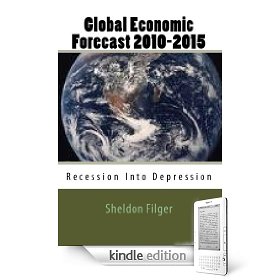The last time members of the political establishment and media commentators seriously grappled with the question posed by my title occurred in the weeks following Senator John McCain’s seemingly mercurial and impulsive selection of Alaskan Governor Sarah Palin as his vice presidential running mate. Many would say that doubts about the intellectual and leadership fortitude of Ms. Palin as a possible successor to an elderly and illness-prone Senator McCain, had he prevailed in the 2008 U.S. presidential election, was a leading factor in persuading many independent voters, and even some Republicans, to cast their votes for Barack Obama.
Despite the continued doubts about her intellectual acumen among many powerbrokers within the Republican Party, echoed by the intuitive feeling among Democrats that if the GOP selected Sarah Palin as their 2012 presidential nominee this would be the best guarantor of a second term in office for President Obama, an objective assessment of Palin’s political viability leads to a different conclusion. No doubt, Sarah Palin (along with many other figures within America’s political establishment) is profoundly ignorant in matters of foreign policy and macroeconomics. However, as the election of George W. Bush to the presidency demonstrated, the intellectual capacity of the commander-in-chief is not a priority among the majority of the American electorate. In a national edifice dominated by corporate media and ten-second sound bites, Palin has demonstrated that she is highly accomplished in the attributes that tend to attract interest and support among the electorate. With Sarah Palin having emerged from the midterm elections as the most visible and potent political brand in the GOP, and likely to further enhance her political rock-star status with her recent television series, <em>Sarah Palin’s Alaska</em> and forthcoming promotional tour in connection with her new book, <em>America By Heart</em>, there is little doubt that should she enter the race for the Republican presidential nomination, Palin would prove to be a formidable competitor.
If Sarah Palin were to be the GOP’s standard bearer in 2012, those who might be praying for such an outcome within the leadership circles of the Democratic National Committee better be careful what they wish for. If the economy were to miraculously recover and the current calamitous joblessness rate significantly recede, the power of incumbency would normally be sufficient to assure Obama would prevail over any Republican challenger in 2012. However, what if the American heartland remains devastated by an unrelenting Great Recession? In a time of economic crisis compounded by never-ending wars abroad against an elusive and ill-defined enemy, Americans like other peoples throughout history may clutch at the charismatic alternative with easy answers and inspiring patriotic slogans. In addition, there is the Tea Party movement, already anointing Sarah Palin as its principle icon, which may prove to be a decisive force in mobilizing alienated Americans on behalf of Palin in a presidential contest with Obama.
The possibility of a Palin presidency cannot be dismissed as logically impossible under the circumstances I have described, and it behooves serious thinkers to reflect on the implications for America and the world if in fact Sarah Palin were to run for president, and prevail over Barack Obama on November 6, 2012. I have <a href=”http://www.eSarahPalin.com” target=”_hplink”>done so</a> in my novel, <em>Sarah Palin Apocalypse Americana</em>, which presents a scenario for the first few months in office of a hypothetical Palin presidential administration. There are elements in Palin’s background, past statements on the public record and demonstrated proclivities that offer much to speculate on.
In her role as the toastmaster of the Tea Party movement and most right-wing corner of the Republican Party, Ms. Palin has demonstrated an intolerance of Americans who harbor views that are contrary to those of Palin and her followers. She has frequently used extreme rhetoric in describing those who do not follow her brand of conservatism as not being merely “liberal,” but “socialists” as well, the implication being that they are somehow un-American. On domestic policy, it is highly likely that Sarah Palin in the White House would contribute to further polarization among the American people.
It is in the arena of foreign policy, however, where I believe a Palin presidency would prove to be a nightmare for America and the world. As far back as the 2008 presidential campaign, then vice presidential candidate Palin told reporters that she supported the Republic of Georgia acceding to full NATO membership while the South Ossetia war was raging between that country and Russia (a war instigated by Georgia) even if that meant an eventual military conflict between Russia and the United States. Palin may lack in-depth knowledge on the Northern Caucasus, but that did not inhibit her from supporting policy prescriptions that could very well lead to global war between the two leading nuclear powers. The impulsive naivete Palin demonstrated at that time is a clear marker of the potential dangers that lurk for world peace, if such an individual were to become America’s next commander-in-chief. The neoconservatives who advise her on foreign policy cannot be expected to be a restraining influence; on the contrary, the neocons are likely to exploit a President Palin to further advance their theories on employing American military power on behalf of their desire to impose “American values” on other countries through force.
Rather than ridicule and seek to belittle Sarah Palin, who continues to advance her political brand despite the arrows of skepticism that have been thrown at her since 2008, those who recognize the acute dangers that would flow from a future Palin presidency should find ways of clearly articulating those dangers so that the electorate will be informed, before it is too late. (information on “Sarah Palin Apocalypse Americana” at http://www.eSarahPalin.com )








